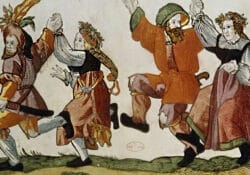

Freedom in Time (Chrono-Politics, Part 2)
by W.D. James | Jul 17, 2024
When the revelation (revolution) comes
When the revelation (revolution) comes
O Lord I want to be in that number
When the saints go marching in
When the rich go out and work
When the rich go out and work
O Lord I want to be in that number
When the saints go marching in
– When the Saints Go Marching In, Traditionali
For Josef Pieper, ‘leisure’ is one way of being in time. In the previous essay, we looked at his analysis of work (the contrary way of being in time) and it is a feature of the modern world to make it so that all time is devoted to work; the tyranny of ‘total work.’ Skepticism about leisure runs deep in our civilization. From the Calvinist ‘protestant work ethic’ to Rousseau’s linkage of leisure to luxury, we don’t quite trust it. Idle hands are the devil’s playground. Pieper would not concur.
Leisure
He is clear that leisure is not just the absence of working. That would be what he terms ‘idleness’ and leisure is the opposite of both work and of idleness. To develop this more robust conception of leisure, he evokes the Aristotelian conception of it and how that was passed down in Christianity as the ‘contemplative life.’ Ultimately, this points to Aristotle’s conception of “the human knowing process.”

As Pieper unpacks it, any genuine act of human knowing involves two mental powers. One is our reason which grasps the world and sets about conceptualizing, searching into, and abstracting it. He does not hold back from describing this aspect of knowing as “an act of aggression.” The other power he terms intellect. Whereas our reason seeks to operate on the world, our intellect operates in a relaxed fashion to make itself open to what the world might want to communicate. This mental power is associated with our intuitive apprehension of how things are. He quotes Heraclitus’ description of this way of knowing as “’Listening-in to the being of things.’”ii This mode or aspect of knowing just takes in, as when we simply take in the vision of landscape. In that case, we aren’t doing something with the landscape, we are just letting it reveal itself to us. At this deep level of our mental processes, the fundamental distinction is already present: reason corresponds to our working upon the world and intellect aligns with the leisurely apprehension of the world.
Aristotle had termed this latter form of knowing ‘contemplation’ and it is this meaning of the term that informs the later Christian distinction of the contemplative life (vita contemplativa) and the life of action (vita activa). This same dichotomy undergirds the traditional distinction between the ‘liberal (free) arts’ and ‘servile labor.’ The latter is servile because it is bound to an end, or purpose, beyond itself. I go to work in the morning so that I can earn money to buy things I need. The need has put me in service to the work. A liberal art is done for its own sake, as valuable in itself, not for some extrinsic purpose which it serves.

Now Pieper brings this line of thought home. “Against the exclusiveness of the paradigm of work as activity,” he asserts, “…there is leisure as ‘non-activity’—an inner absence of preoccupation, a calm, an ability to let things go, to be quiet.”iii This is sort of the surface level of leisure. He pushes a bit deeper: “Leisure is a form of that stillness that is the necessary preparation for accepting reality; only the person who is still can hear, and whoever is not still, cannot hear. Such stillness as this is not mere soundlessness or a dead muteness; it means, rather, that the soul’s power, as real, of responding to the real—a co-respondence, eternally established in nature—has not yet descended into words. Leisure is the disposition of receptive understanding, of contemplative beholding, and immersion—in the real.”iv Now he really starts getting to the crux of the matter. I think we can summarize this point by saying that leisure is a way of being, or existing, in time which disposes us to being open to receive the real; it is when nature is able to speak to us and we to hear. To bring this down to earth a bit a more. When we’re working, when we’re doing stuff, say putting gas into our car or building an Excel spreadsheet, we are telling nature what to do. We have a purpose in mind and we are working on reality to get it to do what we want. When at leisure (not just inactivity, but in the concentrated, undistracted state of receptivity) we are letting nature, reality, reveal itself to us. This might be in genuinely listening to music: the harmony is telling us something about the world. It might be when contemplating some natural beauty, a flower growing in our garden or a sunset over the ocean. In the work mode (which is also the rational mode), we to some extent set upon nature and make it speak as we want it to. In leisurely contemplation we allow reality to tell us what it wants to tell us.
Mystery, celebration, and festival
But Pieper is far from done in his exploration of what leisure is and what we are when at leisure. He continues, “In leisure, there is, furthermore, something of the serenity of ‘not-being-able-to-grasp,’ of the recognition of the mysterious character of the world, and the confidence of blind faith, which can let things go as they will…..”v Think about that flower in the garden alluded to a moment ago. While in the state of contemplation (when the intellect is simply beholding the flower, before reason sets to work to explain the flower), we are just struck by its beauty and perfection. Nature tells us something about herself. There is delicacy, form, color, scent, all manifest together as if to say, ‘this flower is sufficient’.

He makes a keen observation: “Leisure is only possible in the assumption that man is not only in harmony with himself but also that he is in agreement with the world and its meaning. Leisure lives on affirmation.”vi For this form of communication to function, we have to be at one with ourselves (I suppose this is what meditative types refer to as being ‘centered’) and aligned with the world, for it to disclose itself to us. He says, “leisure is the condition of considering things in a celebrating spirit.”vii Yes! In the moment alluded to, the flower (or the sunset) reveals itself to me as it is. The natural affinity between me and the flower is illuminated. In some very real sense, we were made for one another. I know that there is a little cynical voice down inside us saying ‘bosh, what a load of sentimental crud!’ Not at all. We know this is true. We have all had these experiences where we just are present and the world is present to us and we are filled with joy and contentment. That happens! Pieper is helping us understand what is really going on in those sorts of situations. He associates this receptive seeing, in which we are ultimately empowered to be our true selves, with what pre-modern folks called the visio beatifica, the beatific vision, which he describes as the “seeing which confers bliss.”viii In this moment of attunement, we experience “Joy” which is “the response of a lover receiving what he loves.”ix
Pieper pushes onward (well, downward, into deeper territory). “The highest form of affirmation is the festival,” he tells us, it represents “peace, intensity of life and contemplation all at once. The holding of a festival means: an affirmation of the basic meaning of the world, and an agreement with it, and in fact it means to live out and fulfill one’s inclusion in the world, in an extraordinary manner, different from the everyday.”x Elsewhere, he says “To celebrate a festival means: to live out, for some special occasion and in an uncommon manner, the universal assent to the world as a whole.”xi We long for and dream of this level of organic connection with the world. Pieper sees festivity as the breaking into our experience, disrupting our everyday experience, of this realization. It is a witness to how the world really is, and at least a downpayment on how it might be.
Here, in a festival, or a festive encounter with the world, the world of work is put in its place. Pieper says, “…the power to be at leisure is the power to step beyond the working world and win contact with those superhuman, life-giving forces that can send us, renewed and alive again, into the busy world of work. Only in such authentic leisure can the ‘door into freedom’ be opened out of the confinement of that ‘hidden anxiety,’ which a perceptive observer [Richard Wright] has seen as the distinctive character of the working world, for which ‘employment and unemployment are the only poles of an existence with no escape.’”xii Here we have regained the balance, really the rhythm since we are dealing with time, of a fulfilled and organically attuned human existence.

What undergirds the human capacity to have a festival? For Pieper, it grows out of “worship.”xiii Before we worry that he is getting all ‘churchy’ on us, let’s pay close attention to what he is actually suggesting. He is saying that the ability to leave behind, for a time at least, the work realm of function, and enter into the non-functional realms of leisure, celebration, and festival, comes from our capacity for worship. He is pointing to a dialectical, back and forth, motion here. In our human capacity to open ourselves to “God”, or Being, or “the gods” (Pieper uses both the terms in quotation marks), we receive in turn the capacity to celebrate the world around us as revealed by this encounter with sacredness. Further, we receive the power to claim back some of our time from the lesser world of work.
To tie up this exploration with a nice bow, and to articulate the meaning behind the title of his book, Pieper draws the etymological connection between the words ‘cult’ and ‘culture.’ On his accounting of things, it is from this worshipful encounter with the ‘supra-human’ aspect(s) of the world around us, that the reflex action of celebration can emerge. The history of cults (Latin cultus), religions, is the sustained rhythm of these encounters. Religion, spiritual life if you prefer, is the practice of repeating this receptive encounter with the world. Our projects (work) take a holiday. From this may arise a different form of activity which is the fruit of leisure: culture (in the honorific sense Pieper accords it). Song, dance, mythos, festival, literature, art. This is why they, when growing from authentic ground, always speak to us of higher things. These require sacrifice. We must give up some of the time that work would claim of us. Pieper suggests that work, by its nature, seeks to encompass all time, all space, and all of our energy. To open up a time of leisure we must sacrifice some of that time. Deny it to our utilitarian needs. In response, we may be richly rewarded by the wealth of a time in which we are at one with ourselves and with the world, and during which we are free, we may “rest from work.”
Lastly, Pieper warns of the temptation to manufacture festivals. That would be to subject the festive to the regime and mode of work. Think of all our false holidays which do not convey much festivity to us. The festivity, the celebration, must emanate from a genuine experience of worshipful openness. Then there will be a supra-human energy that flows to us and from which we make our celebration. Here some of the paradoxes that characterize all religions and all spiritual sensibility come to the fore. By being open, we are filled. By giving, we receive. By worshipping, we gain our freedom. These are not sentimental platitudes; they are metaphysical truths.
As the forces of modernity submerged the natural, organic, relationship to time, the sacred dimension of time was also largely occluded. Pieper has helped us gain a perspective on that as well. In the next essay, focused on the idea of ‘sabbath’, we’ll look deeper into that aspect.

Subscribe to Winter Oak
i An instrumental rendition by the Traditional New Orleans Jazz Band: New Orleans Traditional Jazz – When the Saints Go Marching In! (youtube.com). They play street parades and funerals. Turning a funeral into a celebration is pulled off by a number of cultures.
ii Josef Pieper, Leisure: The Basis of Culture, translated by Gerald Malsbary, St. Augustine’s Press, 1998, p. 11.
iii Ibid, p. 31.
iv Ibid, p.31.
v Ibid, p. 31.
vi Ibid, p. 33.
vii Ibid, p. 33.
viii Josef Pieper, In Tune With the World: A Theory of Festivity, translated by Richard and Clara Winston, St. Augustine’s Press, 1965, p. 15.
ix Ibid, p. 23.
x Op. Cit., pp. 33-34.
xi In Tune, p. 30.
xii Op. Cit., pp. 35-36.
xiii Ibid, p. 57.





0 Comments